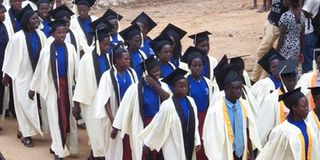Varsities offer hope to West Nile’s poor

Students match through Arua Town ahead of their graduation recently. PHOTO BY FELIX WAROM OKELLO.
West Nile- To many analysts, university education is tailored to serve the interests of the middle class and alienate the poor. And to support their case, many universities in Uganda have for many years been located in urban areas, with the central region having the majority of the institutions.
However, over the last five years, the trend has shifted and many universities are extending their branches to different regions across the country to accommodate the students, who, due to poverty, cannot easily afford the cost of university education in Kampala.
One such region to benefit from this expansion is West Nile. Dogged by many years of poverty and low productivity, many parents have been unable to pay tuition fees charged by universities outside the region.
But a recent survey by the Daily Monitor indicates a change in fortunes as the number of university graduates in the region has more than tripled in recent years following the starting of several universities in the region.
Data from the region’s district education offices show that students enrolling for the university education stands at 1,212 at all universities from 300 that used to go outside the region, mostly to Gulu and Makerere universities.
Nile University, Islamic University in Uganda, Makerere University Business School, Uganda Christian University (UCU) and Bugema University have all opened branches in the region and are offering certificates, diploma, degrees and masters programmes.
They are absorbing thousands of students who get stranded after completing secondary education.
Ms Joyce Amandu, a student who has just completed from the UCU campus in Arua, says the institutions are a welcome relief for many low income earners.
“In Kampala, most of your money is spent on rent and food and one cannot concentrate on studies properly. Extending such services for the for rural people will make education affordable,” Ms Amandu says.
The business community and civil servants have all now joined the institutions to upgrade.
Mr Joseph Candia, a graduate, says the extension of the universities to the region will spearhead growth and economic empowerment of the people.
“Transport, accommodation, and living expenses and tuition fees were unaffordable for poor parents. But now costs have been cut and have become affordable and accessible,” Mr Candia said.
The director of Nile University, Fr Nakari Adiga, said the inequality in higher education is due to the economic disparities but there is now societal change.
”We have come to a consensus that rural people should be able to move up the ladder of accomplishment of talents, character and determination in competing with other regions academically.”
During the ground-breaking ceremony of Muni University in Arua recently, the Minister of Education, Ms Jessica Alupo, said: “The University will create opportunity for innovation and provide quality education and community empowerment for the region.”
As a result, many employment opportunities have been provided to hundreds of people in the region.
Mr Stephen Acidri, a lecturer, said the universities also offer opportunity for imparting innovation and skills to the people. “Some of got us got employment here because of these universities unlike in the past where such opportunities were rare,” he said.
Some civil servants also argue that without the universities, promotions at workplace would not have been possible.
However, emphasis is now on improving quality of education provided in these institutions.




